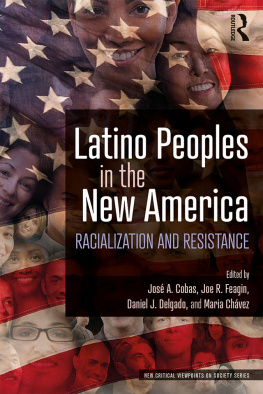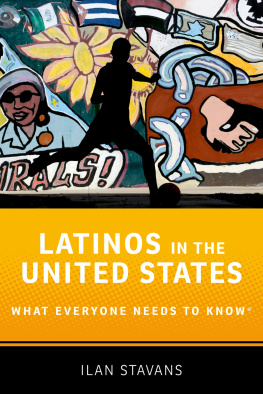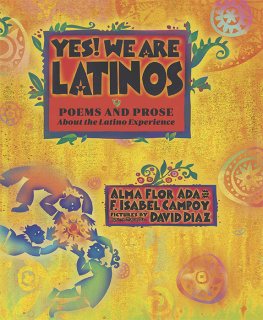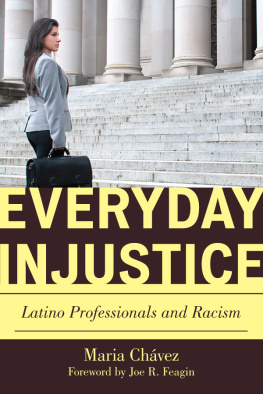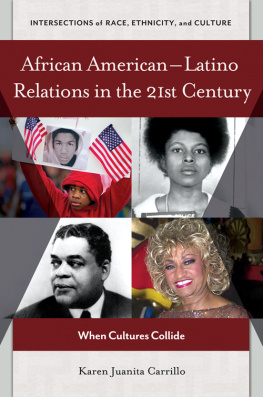Latin@s in the World-System
LATIN@S IN THE
WORLD-SYSTEM
Decolonization Struggles in
the Twenty-First Century
U.S. Empire
edited by
Ramn Grosfoguel, Nelson Maldonado-Torres, and
Jos David Saldvar
Political Economy of the World-System Annuals, Volume XXVIII
Immanuel Wallerstein, Series Editor
First published 2005 by Paradigm Publishers
Published 2016 by Routledge
2 Park Square, Milton Park, Abingdon, Oxon OX14 4RN
711 Third Avenue, New York, NY 10017, USA
Routledge is an imprint of the Taylor & Francis Group, an informa business
Copyright 2005, Taylor & Francis.
All rights reserved. No part of this book may be reprinted or reproduced or utilised in any form or by any electronic, mechanical, or other means, now known or hereafter invented, including photocopying and recording, or in any information storage or retrieval system, without permission in writing from the publishers.
Notice:
Product or corporate names may be trademarks or registered trademarks, and are used only for identification and explanation without intent to infringe.
Library of Congress Cataloging-in-Publication Data
Latin@s in the world-system: decolonization struggles in the twenty-first
century U.S. empire / edited by Ramn Grosfoguel, Nelson Maldonado-Torres,
and Jos David Saldvar.
p. cm. (Political economy of the world-system annuals; v. 28)
Includes bibliographical references and index.
1. United StatesCivilizationHispanic influences. 2. Hispanic
Americans. 3. DecolonizationUnited States. I. Grosfoguel, Ramn. II.
Maldonado Torres, Nelson. III. Saldvar, Jos David. IV. Series.
E169.12.L347 2005
305.868'073'09051dc22
2005008327
Designed and Typeset by Straight Creek Bookmakers.
ISBN: 978-1-594-51136-3 (pbk)
ISBN: 978-1-594-51135-6 (hbk)
Contents
Ramn Grosfoguel, Nelson Maldonado-Torres and Jos David Saldvar
Immanuel Wallerstein
Enrique Dussel
Walter D. Mignolo
Agustn Lao-Montes
Lewis R. Gordon
James V. Fenelon and Thomas D. Hall
Roberto Hernndez
Santiago E. Slabodsky
Laura E. Prez
James Cohen
Susanne Jonas
Thomas Ehrlich Reifer
Latin@s and the Euro
American Menace
Ramn Grosfoguel, Nelson Maldonado-Torres, and
Jos David Saldvar
Immanuel Wallerstein (1991; 1998) characterizes the beginning of the twenty-first century as a transitional moment, a bifurcation toward the end not only of U.S. hegemony but also of the present historical system. According to Wallerstein, during the twenty-first century we will witness the demise of the U.S. empire and of capitalism as a world-system. Both are in terminal crisis (Wallerstein 1991; 2003). This historical system has lasted for more than 500 years. Moreover, according to Wallerstein (1991), we will witness a bifurcation toward a new historical system. Depending on our social agencies and interventions in this moment of bifurcation, the transition toward a new historical system could lead either to a better or to a worse system than the present one. Nothing is predetermined nor guaranteed about the future. There could be a fairer, just and egalitarian historical system or a more exploitative and coercive one. If Wallerstein (1998) is correct in this assessment, then we need to urgently rethink our utopias in order to create alternative worlds.
As Immanuel Wallerstein has shown in his historical sociology, the transition from feudalism to the modern/colonial world in Europe was not as the Marxist and liberal narratives have represented it: a bourgeois class that emerged in the cities and displaced through reforms or revolutions the feudal aristocracy (Wallerstein 1974, 1979). Rather, it was the same feudal aristocracy that in looking for a solution to the crisis of the old system created a new historical system; namely, the European modern/colonial capitalist/patriarchal world-system (Grosfoguel 2004). Wallersteins provocative thesis is that the new historical system that emerged in the late fifteenth century was worse; that is, less egalitarian, more destructive of nature and more discriminatory than the old system it replaced (Wallerstein 1991). Can this scenario repeat itself? In recent work, Wallerstein suggests that similar to the transition between the previous historical system and the modern/colonial world in the late fifteenth century, today we are facing a moment of bifurcation. And like before, such a moment opens up new historical possibilities. Among those possibilities, one cannot rule out that the twenty-first-century-transnational capitalist elites will follow a strategy similar to the feudal aristocracy of the late fifteenth century and may create a new historical system worse than the one in which we live, in order to maintain their privileges. Another possible scenario is that subaltern groups around the globethose to whom Fanon referred as the condemned of the eartheffectively mobilize and help to create a new and/or diverse historical system better than the one in which we live now. To be sure, there are many other possible scenarios on the horizon of historical possibility. The power of political and religious fundamentalisms, as they are clearly manifested today in the actions of Western state leaders and sworn enemies of the West, cannot be underestimated. The clash of fundamentalism, as Tariq Ali has referred to them (2002), gives new impulse to old colonial legacies and not so old racist configurations of society. Subjects who find themselves in the interior of states or regions under the power or strong influence of such ideologies sometime comply, sometime oppose, but many times simply do whatever is necessary to survive. Just like one cannot underestimate the strength and influence of the fabrication of new ideologies of war by the worlds new fundamentalists and their allies, one cannot lose from view the decolonizing potential of multiple projects and demographic changes in many parts of the globe, including the very metropolitan centers that have taken the lead in designing a twenty-first-century ideology of war. Transformations in the metropolitan centers of the capitalist world-system are crucial for future transformations, including any possible bifurcation. One of these transformations is the significant growth and political/cultural impact of Latin@ populations within the United States, the most powerful core country in the capitalist world-system today. We will examine here the topic of the growth of the Latin@ population in the United States in light of the global context of world-systemic changes as well as in relation to the continuous efforts to decolonize the U.S. nation and empire.
Latin@s and the Decolonization of the U.S. Empire
In the year 2000, non-Hispanic whites were a demographic minority in 70 percent of the U.S. cities while Latin@s were the fastest growing population. Latin@ populations increased 50 percent between 1990 and 2000. The majority are working class and racialized subjects (Chican@s, Salvadoreans, Puerto Ricans, Dominicans, indigenous People, Afro-Latin@s, etc.) coming from colonial and neocolo-nial experiences in the periphery of the world-economy. They are among the groups with the worst poverty rates in the country (see Table 1). Today the Latin@ population constitutes the largest minority in the United States: they represent around 12.8 percent of the total population. Conservative estimates made by the U.S. Census of Population in 1998 and based on the 1990 U.S. Census, project that by the year 2060 non-Hispanic whites will be a demographic minority in the U. S. (see Table 2) and Latin@s will be the largest minority in the country (25 percent of the total population). Recent estimates based on the 2000 Census, project that non-Hispanic whites will be half of the U.S. population in 2050 (see Table 3). Alternative estimates suggest that if the Latin@ population continues growing at the same rate of the 1990s, they will represent at least half, if not the majority, of the total population of the United States sometime in the twenty-first century.


